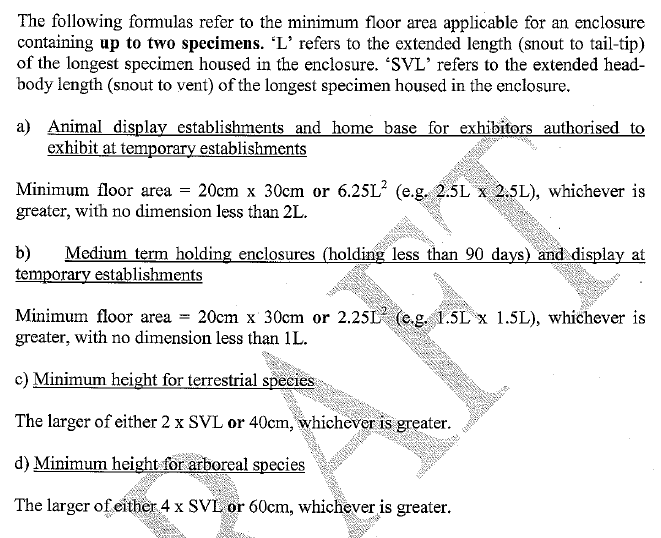We ask that all keepers in NSW email the Department at
[email protected] and insist that those involved in developing and implementing the Code of Practice make themselves available to meet with us - their own appointed expert advisory group. The fact that they have yet again avoided any arrangement to discuss our concerns by allowing only written submissions is entirely unsatisfactory. Written submissions will disappear into the bureaucratic maw, be examined by the individuals at the Dept of Primary Industry (who are driving this, and who insist that enforceability in law is essential), and the outcome for keepers will be the same as they propose at this time.
Respondents should also insist that DECCW release, on the DECCW website, a copy of the Code in its current form. They have refused to release electronic copies because they are easy to circulate widely, and it suits them to allow a degree of confusion in the keeping community. This Code will impact thousands of keepers in NSW, and the EAG believes it will serve no practical purpose in improving the welfare of captive reptiles in NSW.
Ask the Department to produce evidence of widespread problems with reptile welfare in NSW, and if the Department cannot do this, ask why a code, enshrined in law, is needed for a 'problem' which doesn't exist.
The appointment of the Expert Advisory Group was simply an exercise in window dressing for DECCW. They, and their masters at DII, clearly had a very firm view of the outcome they wanted, even before we met for the first time. This has been made evident from documents we obtained under FOI. We were mislead into believeing that we were contributing to a transparent and collaborative process which would benefit the welfare of captive reptiles in NSW. It has not turned out like that at all. At every meeting, and in every conversation, the EAG was unanimous in its insistence that the Code be based around recommendations, rather than enforceable standards, and it seemed to us that DECCW understood and accepted the good sense in this. However, the DII submission to DECCW condemned DECCW for wording the Code ambiguously, and was insistent that enforceability in the courts was THE primary consideration.
All this debate could be avoided if DECCW operatives agree to meet with us across the table. It is very evident that they don't want scrutiny of the Code itself - they have not released any electronic copies which would be easy to circulate widely, and they especially do not want us to question the motivation behind the development of the Code itself, because it is based on the personal viewpoints of the individuals in DECCW and DII.
Bureaucratic interference in the lives of fauna keepers in Australia is taken for granted by keepers in all states. It is just a way of life in this country, and it is always portrayed as necessary for conservation. It seems to escape the notice of the various state bodies that, despite them doing business in the same ways they were in the 1960s and 1970s, the conservation status of a huge number of species lurches towards critical... There is a conveyor belt to extinction (to use the phrase of a good friend of mine) happening out there, and we have a 'conservation' Department here in NSW spending who knows how many hundreds of thousands of dollars, on a problem they can't even prove exists. And it has nothing to do with conservation.
J




